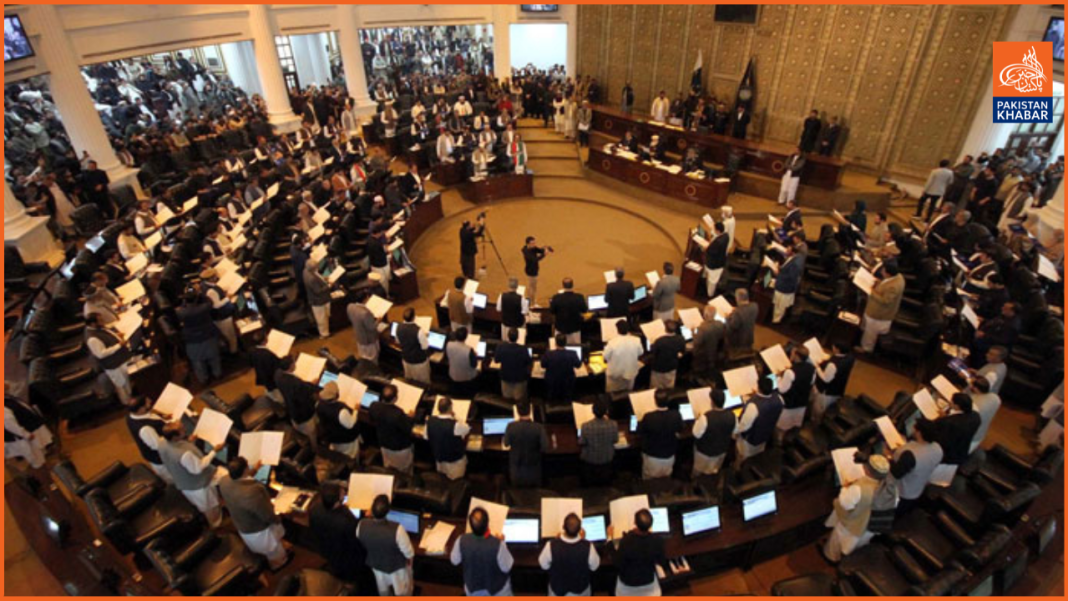On Tuesday, the Khyber Pakhtunkhwa Assembly rejected the federal government’s steering committee formed to oversee development schemes under the Accelerated Implementation Programme (AIP) in the merged tribal districts, formerly known as Fata.
The decision was made through a joint resolution, which received the majority approval of Members of the Provincial Assembly (MPAs) during a session led by Deputy Speaker Suraiya Bibi.
Opposition members criticized the motion, calling the federal government’s actions a positive step, as they argued that funds allocated for the merged areas had never been properly utilized there.
PTI lawmaker Ajmal Khan introduced the resolution, which was supported by other members, including Anwar Zaib, Shafiullah, Fazal Shakoor, Abdul Ghani, and Aurangzaib Khan.
The federal government had formed a steering committee to manage the allocation of funds in the tribal districts under the AIP. This committee consists of the deputy chairman of the Planning Commission, the provincial governor, four MNAs and two MPAs from the merged tribal areas, the secretary of the Finance Division, the additional chief secretary of the province, the chief economist of the Planning Commission, the additional secretary (planning and development), and any co-opted members chosen by the committee chairman.
The opposition members raised concerns, asserting that the federal funds for the development of merged areas were consistently directed to the constituencies of the chief ministers rather than being properly utilized in the tribal regions. They further claimed that since Fata’s merger with KP, the successive PTI-led governments had failed to allocate sufficient development funds for the underdeveloped tribal region.
In presenting the resolution, Ajmal Khan argued that the federal government’s decision to create a committee for recommending and identifying development schemes in the merged districts was unconstitutional, illegal, and undemocratic. He emphasized that the move violated agreements made under the National Finance Commission and undermined provincial autonomy granted under the 18th Constitutional Amendment. He added that after Fata’s merger, it was only the KP government that had the right to handle the administrative, development, and financial matters of the region.
Ajmal Khan stated that the federal government’s action interfered with provincial affairs and violated its promises to the people of the merged areas. He reminded the assembly that the federal government had pledged to release Rs1 trillion over a decade and three percent of the NFC Award for the uplift of the tribal districts, but these commitments had not been fulfilled. As a result, no significant development had been seen in the area.
Through the resolution, the assembly demanded that the federal government withdraw the notification for the formation of the steering committee, deeming it unconstitutional, illegal, and undemocratic. Ajmal Khan also warned that if the federal government did not retract its decision, the provincial government would take legal action against it.
On a point of order, opposition ANP lawmaker Nisar Baaz argued that the funds meant for the merged areas had been diverted to the development of settled districts, specifically in the Malakand Division, during the previous PTI government, as the then-chief minister Mehmood Khan hailed from that area. Nisar Baaz also pointed out that the provincial government had excluded opposition lawmakers from committees tasked with recommending and identifying development schemes, while including non-elected individuals.
In other matters, the assembly passed the Khyber Pakhtunkhwa Code of Criminal Procedure (Amendments) Bill, 2025, and the Khyber Pakhtunkhwa Laws (Amendments) Bill, 2025. The session was adjourned until the following Friday.




